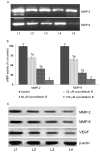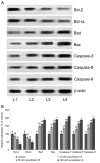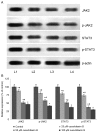Cucurbitacin B inhibits cell proliferation and induces apoptosis in human osteosarcoma cells via modulation of the JAK2/STAT3 and MAPK pathways
- PMID: 28673003
- PMCID: PMC5488743
- DOI: 10.3892/etm.2017.4547
Cucurbitacin B inhibits cell proliferation and induces apoptosis in human osteosarcoma cells via modulation of the JAK2/STAT3 and MAPK pathways
Abstract
Osteosarcoma (OS) is the most commonly diagnosed tumor of the bones in children and young adults. Even with conventional therapies the 5-year survival rate is ~65% in patients with OS. Considering the side effects and aggressiveness of malignant bone tumors, research is focussing on multi-targeted strategies in treatment. Cucurbitacin B, a triterpenoid compound has been demonstrated to induce apoptosis in various cancer cell types. The Janus kinase 2/signal transducer and activator of transcription 3 (JAK2/STAT3) signalling cascades and mitogen activated protein kinases (MAPK) signalling cascades are critical regulators of tumorigenesis. The present study assessed the influence of cucurbitacin B on the viability and expression of MAPKs and proteins of the JAK2/STAT3 cascades in human OS cells (U-2 OS). Cucurbitacin B (20-100 µM) significantly reduced cell viability (P<0.05) and induced apoptosis, as assessed by MTT and Annexin V/propidium iodide staining, along with inhibiting cell migration. Gelatin zymography revealed supressed activities of matrix metalloproteinase (MMP-)2 and 9. Furthermore, cucurbitacin B effectively upregulated the apoptotic pathway and caused the effective inhibition of MAPK signalling and JAK2/STAT3 cascades. Multifold suppression of vascular endothelial growth factor by cucurbitacin B was also observed, indicating inhibition of angiogenesis. Thus, by downregulating major pathways-MAPK and JAK2/STAT3 and MMPs, cucurbitacin B has potent anti-proliferative and anti-metastatic effects that require further investigation with regards to cancer treatment.
Keywords: Janus kinase/signal transducer and activator of transcription pathway; apoptosis; cucurbitacin; mitogen activated protein kinases; osteosarcoma.
Figures








References
-
- Thayanithy V, Park C, Sarver AL, Kartha RV, Korpela DM, Graef AJ, Steer CJ, Modiano JF, Subramanian S. Combinatorial treatment of DNA and chromatin-modifying drugs cause cell death in human and canine osteosarcoma cell lines. PLoS One. 2012;7:e43720. doi: 10.1371/journal.pone.0043720. - DOI - PMC - PubMed
LinkOut - more resources
Full Text Sources
Other Literature Sources
Miscellaneous
